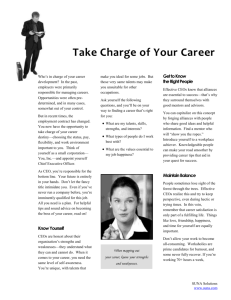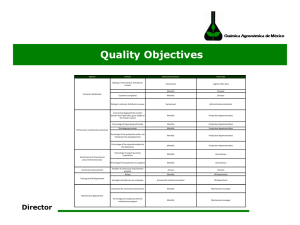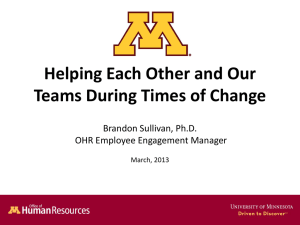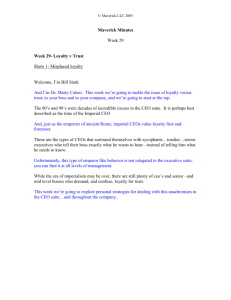Leading Egde Compensation and Benefits Programs
advertisement
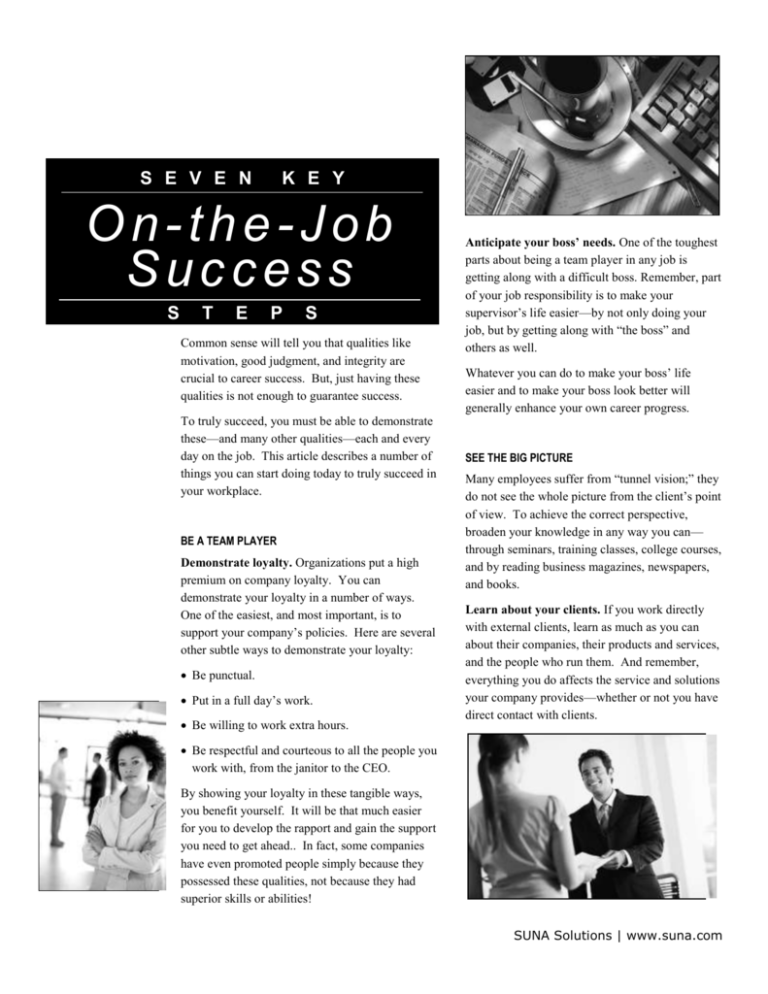
S E V E N K E Y On-the-Job Success S T E P S Common sense will tell you that qualities like motivation, good judgment, and integrity are crucial to career success. But, just having these qualities is not enough to guarantee success. To truly succeed, you must be able to demonstrate these—and many other qualities—each and every day on the job. This article describes a number of things you can start doing today to truly succeed in your workplace. BE A TEAM PLAYER Demonstrate loyalty. Organizations put a high premium on company loyalty. You can demonstrate your loyalty in a number of ways. One of the easiest, and most important, is to support your company’s policies. Here are several other subtle ways to demonstrate your loyalty: Be punctual. Put in a full day’s work. Be willing to work extra hours. Anticipate your boss’ needs. One of the toughest parts about being a team player in any job is getting along with a difficult boss. Remember, part of your job responsibility is to make your supervisor’s life easier—by not only doing your job, but by getting along with “the boss” and others as well. Whatever you can do to make your boss’ life easier and to make your boss look better will generally enhance your own career progress. SEE THE BIG PICTURE Many employees suffer from “tunnel vision;” they do not see the whole picture from the client’s point of view. To achieve the correct perspective, broaden your knowledge in any way you can— through seminars, training classes, college courses, and by reading business magazines, newspapers, and books. Learn about your clients. If you work directly with external clients, learn as much as you can about their companies, their products and services, and the people who run them. And remember, everything you do affects the service and solutions your company provides—whether or not you have direct contact with clients. Be respectful and courteous to all the people you work with, from the janitor to the CEO. By showing your loyalty in these tangible ways, you benefit yourself. It will be that much easier for you to develop the rapport and gain the support you need to get ahead.. In fact, some companies have even promoted people simply because they possessed these qualities, not because they had superior skills or abilities! SUNA Solutions | www.suna.com KNOW WHERE THE POWER IS Organizations are, by their very nature, “political” to some degree—in the sense that certain people in the company hold power disproportionate to their positions. In some cases, you may find that getting ahead in your company will be tied to your ability to emulate the style of your superiors. While it is not recommended you try to become a clone of key managers, to say that you do not have to concern yourself with company politics would be naïve. Take charge. One of the best, if not the easiest, ways of gaining recognition from key superiors is to take on those jobs that no one else wants to do—providing you’re doing them for the right person and it’s the right kind of job. Taking on a boring assignment involving little effort is likely to be unappreciated. But taking charge of a highly visible effort, such as the corporate charity fundraising in your company, could gain you important recognition. PROTECT YOUR INTEGRITY Refuse to compromise your values and ethics. To illustrate the importance of this principle, consider this example: A few months after a man found a position as a chief financial officer with a medium-sized public company, the chairman of the board called him in and told him how he wanted the financial statements to look in the next quarterly report. The company, as it turned out, was considering a merger, and the chairman wanted the financial statements to make the company’s financial position look stronger than it really was. The CFO balked and the chairman gave him an ultimatum: follow orders or leave. The CFO was obviously in a difficult position. He liked his job and made good money. But he refused to compromise his integrity, so he left. The merger did take place, but none of the key executives in the organization were retained by the acquiring company. And, once the financial discrepancies became evident, there were all sorts of investigations. The CFO, in the meantime, did well for himself. He found a job at a higher salary with another company. So, by protecting his integrity, he protected his career. LEARN TO MANAGE TIME Time is in short supply for most employees. So, the better you manage your time, the more successful you’ll be in your career. While there is no right way to manage your time, there are several basic techniques you should find helpful. Rank your day. Begin each workday with a written agenda of your tasks ranked according to priority. Not all tasks will be equally appealing, but try to resist the temptation of postponing the unpleasant ones. Tackle your high priority items first. When planning your day, allot enough time to handle each item on your agenda. If it looks as though there is too much work for you to handle, don’t be afraid to admit you can’t do it all. Ask for help. Successful people, as a rule, are not embarrassed to speak up and ask for help if they are truly overloaded. They know that asking for help is not a sign of weakness. Here are some additional steps you can follow to help you manage your time more effectively: Regularly review priorities. For example, rank priority by giving each task a number from one (highest) to four (lowest), and review the list several times daily to make any adjustments. As much as possible, control the phone. Let voice mail pick up if you are working on a task that requires sustained concentration. Keep your work area organized. Get into the habit of straightening your desk two or three times a day. You’ll be amazed how much time you’ll save by not having to search through piles of papers and documents! SUNA Solutions | www.suna.com MANAGE YOUR STRESS Stress is inherent in most occupations. Nearly everything employees do has some sort of deadline associated with it. Not surprisingly, this and other factors contribute to overwhelming amounts of stress, which can lead to job burnout. Overcoming burnout. When work is the first thing you think about when you get up and the last thing you think about when you go to sleep, you may be in trouble. Burnout is not a weakness. On the contrary, employees who are most susceptible to it are highly energetic and have a great capacity for work. So what do you do about it? Here are some suggestions from the experts: Recognize that burnout is a problem. Attend to it, or it will impact your health. If the problem is serious, take a long vacation as soon as possible. accomplishments. Second, such a file becomes invaluable should you decide to leave the firm. Your resume will be much easier to put together, and you will have strong and complete facts to present to potential employers. OVERALLL KEYS TO SUCCESS Today, doing your job well is not enough to assure you of rapid progress in your company. Equally important is making sure your superiors perceive you as a valuable contributor to the company’s success. Here is a summary of things you can do to ensure your career continues to flourish: Show loyalty to the firm. See the totality of your job. Understand and anticipate your boss’ needs. Take credit (modestly) for your work. Do not schedule any work for the weekend. And do what you can to limit nightly work. Give co-workers and subordinates the same respect you show your superiors. Get away from the scene of the stress. If possible, go out for lunch or at least a walk. Gain recognition by accepting certain assignments nobody else will. Narrow the focus of your tasks. Clear your desk of everything except the project you’re working on. Manage your time efficiently. Restructure your work responsibilities. If you need help, do not be embarrassed to ask for it. Be aware of, and take steps to, counteract jobrelated stress. Maintain your own personnel file containing your key accomplishments. If you have an office door, close it. It’s amazing how much a small change in the environment can relax you. KEEP A PERSONNEL FILE Whatever your specialty, you should keep your own personnel file. The file should contain a running record of every major assignment, complete with details on clients with whom you’ve worked, descriptions of tasks completed and results. This file should highlight your accomplishments. Needless to say, the file should never include confidential or sensitive information. Be prepared. You’ll benefit from this file in several ways. To start, when the time comes for a salary review, you will be in a position to present a strong case on your behalf—based on your SUNA Solutions | www.suna.com
